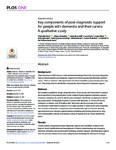Key components of post-diagnostic support for people with dementia and their carers: A qualitative study
| dc.contributor.author | Bamford, C | |
| dc.contributor.author | Wheatley, A | |
| dc.contributor.author | Brunskill, G | |
| dc.contributor.author | Booi, L | |
| dc.contributor.author | Allan, L | |
| dc.contributor.author | Banerjee, Sube | |
| dc.contributor.author | Harrison Dening, K | |
| dc.contributor.author | Manthorpe, J | |
| dc.contributor.author | Robinson, L | |
| dc.date.accessioned | 2022-03-04T12:22:44Z | |
| dc.date.issued | 2021-12-20 | |
| dc.identifier.issn | 1932-6203 | |
| dc.identifier.issn | 1932-6203 | |
| dc.identifier.other | e0260506 | |
| dc.identifier.uri | http://hdl.handle.net/10026.1/18887 | |
| dc.description.abstract |
<jats:sec id="sec001"> <jats:title>Background</jats:title> <jats:p>There has been a shift in focus of international dementia policies from improving diagnostic rates to enhancing the post-diagnostic support provided to people with dementia and their carers. There is, however, little agreement over what constitutes good post-diagnostic support. This study aimed to identify the components of post-diagnostic dementia support.</jats:p> </jats:sec> <jats:sec id="sec002"> <jats:title>Methods</jats:title> <jats:p>We adopted a qualitative design using interviews, focus groups and observation to explore the perspectives of key stakeholders on the content of post-diagnostic dementia support. Purposive sampling was used to identify sites in England and Wales recognised as delivering good practice. Participants included 17 people with dementia, 31 carers, 68 service managers or funders, and 78 frontline staff. Interviews and focus groups were audio recorded and transcribed for analysis. Forty-eight sessions of observation were completed and recorded in fieldnotes. Components were identified through an inductive, thematic approach and cross-checked against national guidelines and existing frameworks; they were subsequently critically reviewed by a range of experts and our mixed stakeholder panel.</jats:p> </jats:sec> <jats:sec id="sec003"> <jats:title>Results</jats:title> <jats:p>Twenty distinct components of post-diagnostic support were identified, related to five themes: timely identification and management of needs; understanding and managing dementia; emotional and psychological wellbeing; practical support; and integrating support. The first and last of these were cross-cutting themes facilitating the delivery of a unique constellation of components of post-diagnostic support to each individual living with dementia or dyad at a particular time.</jats:p> </jats:sec> <jats:sec id="sec004"> <jats:title>Conclusions</jats:title> <jats:p>Our work offers an empirically based framework to inform the development and delivery of holistic, integrated and continuous dementia care from diagnosis to end of life. It highlights the relevance of many components to both people living with dementia and their carers. Since the framework was developed in England and Wales, further research is needed to explore the relevance of our components to other sectors, countries and care systems.</jats:p> </jats:sec> | |
| dc.format.extent | e0260506-e0260506 | |
| dc.format.medium | Electronic-eCollection | |
| dc.language | en | |
| dc.language.iso | en | |
| dc.publisher | Public Library of Science | |
| dc.subject | Adult | |
| dc.subject | Aged | |
| dc.subject | Aged, 80 and over | |
| dc.subject | Caregivers | |
| dc.subject | Dementia | |
| dc.subject | Female | |
| dc.subject | Focus Groups | |
| dc.subject | Humans | |
| dc.subject | Interviews as Topic | |
| dc.subject | Male | |
| dc.subject | Middle Aged | |
| dc.subject | Qualitative Research | |
| dc.subject | Social Support | |
| dc.title | Key components of post-diagnostic support for people with dementia and their carers: A qualitative study | |
| dc.type | journal-article | |
| dc.type | Journal Article | |
| dc.type | Research Support, Non-U.S. Gov't | |
| plymouth.author-url | https://www.webofscience.com/api/gateway?GWVersion=2&SrcApp=PARTNER_APP&SrcAuth=LinksAMR&KeyUT=WOS:000755188900008&DestLinkType=FullRecord&DestApp=ALL_WOS&UsrCustomerID=11bb513d99f797142bcfeffcc58ea008 | |
| plymouth.issue | 12 | |
| plymouth.volume | 16 | |
| plymouth.publication-status | Published online | |
| plymouth.journal | PLoS One | |
| dc.identifier.doi | 10.1371/journal.pone.0260506 | |
| plymouth.organisational-group | /Plymouth | |
| plymouth.organisational-group | /Plymouth/Faculty of Health | |
| plymouth.organisational-group | /Plymouth/Faculty of Health/Peninsula Medical School | |
| plymouth.organisational-group | /Plymouth/Faculty of Health/Peninsula Medical School/PMS - Manual | |
| plymouth.organisational-group | /Plymouth/REF 2021 Researchers by UoA | |
| plymouth.organisational-group | /Plymouth/REF 2021 Researchers by UoA/UoA03 Allied Health Professions, Dentistry, Nursing and Pharmacy | |
| plymouth.organisational-group | /Plymouth/Users by role | |
| plymouth.organisational-group | /Plymouth/Users by role/Academics | |
| plymouth.organisational-group | /Plymouth/Users by role/Researchers in ResearchFish submission | |
| dc.publisher.place | United States | |
| dcterms.dateAccepted | 2021-11-11 | |
| dc.rights.embargodate | 2022-3-5 | |
| dc.identifier.eissn | 1932-6203 | |
| dc.rights.embargoperiod | Not known | |
| rioxxterms.versionofrecord | 10.1371/journal.pone.0260506 | |
| rioxxterms.licenseref.uri | http://www.rioxx.net/licenses/all-rights-reserved | |
| rioxxterms.licenseref.startdate | 2021-12-20 | |
| rioxxterms.type | Journal Article/Review |


